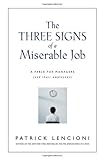For this week I am going to blog through Patrick Lencioni’s book The Three Signs of a Miserable Job.
I’m doing this for a few reasons.
1. This is one of Lencioni’s best books
This is the first Lencioni book that I ever read and I still regard it as one of his best. Lencioni is one of the best thinkers on leadership, management, and the modern workplace today. His books address core issues of our work in a simple yet very profound way. Reading this particular book led me to enjoy and benefit from all of his other works as well, and I hope many of you can have the same experience.
2. Low job fulfillment is one of the biggest struggles in the modern workforce
As I talk to people all over the country and around the world, it appears to me that lack of job fulfillment is one of the biggest struggles in the modern workforce. This is slightly paradoxical, because it is also true that we are living at a time where more and more people are finding greater fulfillment in their work than ever before. Nonetheless, I think Lencioni captures the issue well when he writes that “more people out there are miserable in their jobs than fulfilled by them” (p. 219). So, in spite of the progress that has been made, there is still a lot of work to do.
3. There is a substantial organizational and human cost to low job fulfillment
Low job fulfillment takes a significant toll on both organizations and people. The organizational cost is decreased productivity and effectiveness. But even more significant than this economic toll, I would argue, is the sheer human cost that lack of job fulfillment exacts. Miserable jobs generate a real form of suffering which has ripple effects into the rest of one’s life. If we can address the issue of job fulfillment effectively, the benefits to people will also affect spill over — thus having an uplifting effect throughout all aspects of society. More on this later.
4. There are simple remedies
Low job fulfillment, in most cases, has some simple remedies. You don’t have to go through complex management training to solve the problem of low job satisfaction. Neither do you have to implement complex plans and schedules and systems. Instead, there are some very basic, very simple things that employees and managers can do to address this problem. Usually it doesn’t even require switching jobs. (As we can see, any job can be miserable and almost any job can be meaningful — there is a difference between a miserable job and a bad job.)
And this is where Lencioni especially shines. Perhaps more than anyone else today, Lencioni illustrates that simple, common sense wisdom can have a far greater effect in making our jobs and organizations run better than most intricate and complex solutions. I hope that this series can be an illustration of that reality to the case of job fulfillment, and that in the process it can help many come to find greater fulfillment in their work.
One last word on the book: Like Lencioni’s other books, The Three Signs of a Miserable Job consists of two parts. The first part is a management fable that illustrates the concepts through a compelling story. The second part is a description of the concepts, or model. I will just be covering the model, and thus would highly recommend getting a copy of the book so that you can see how the concepts play out in the story.
Posts in This Series
- The 3 Signs of a Miserable Job: An Introduction
- What is a Miserable Job?
- What are the Effects of a Miserable Job?
- What Makes a Job Miserable?
- 5 Benefits of Managing for Job Fulfillment
- Addressing the First Sign: Anonymity
- Addressing the Second Sign: Irrelevance
- Addressing the Third Sign: Immeasurement
